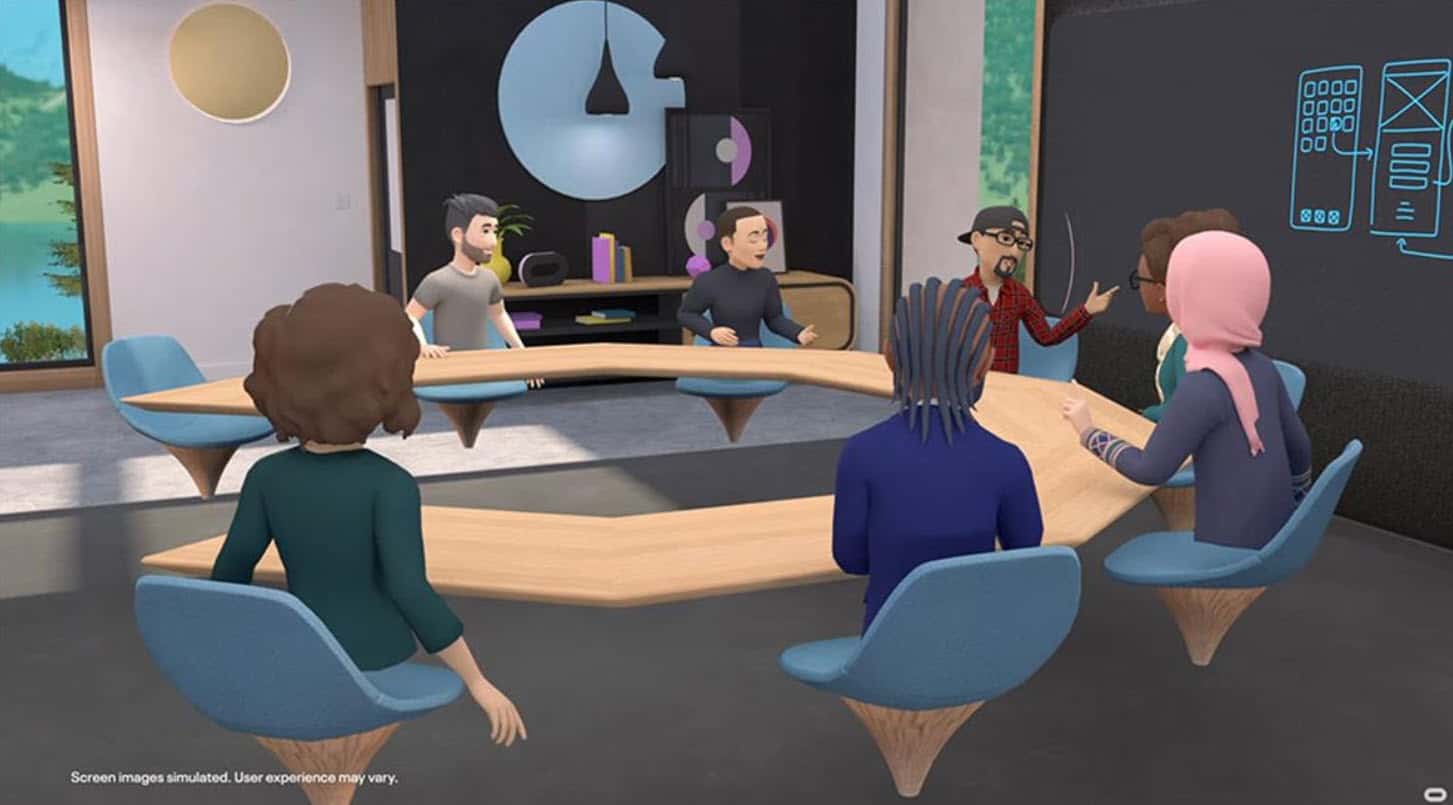What Is The Metaverse? Facebook’s Strategy And How Microsoft, Disney, and Amazon Could Win.
What Is A Metaverse?
Simply put, a Metaverse is a digital space represented by digital representations of people, places, and things. In other words, it’s a “digital world” with real people represented by digital objects.
In many ways, Microsoft Teams or Zoom is already a form of a Metaverse. You are “there” in the room, but you may be a static image, an avatar, or a live video. So Metaverse is a broader context for “bringing people together.”
It can be used for many things: meetings, visiting a factory floor, onboarding, or training. In fact, almost every HR and talent-related program can be redesigned for the Metaverse. And if you wear 3D glasses, the Metaverse is fully immersive.
Many vendors will play in this space. Facebook, of course, chose to rename their entire company to make a point. Microsoft (as I’ll explain below) already has a major presence. But it’s going to be far bigger. In fact, every tech company, retailer, and entertainment business wants in.
Why Does It Feel So Strange?
When you ask experts about the word Metaverse, they explain that it was coined years ago in a science fiction book. But for the rest of us, it sounds like some creepy thing Mark Zuckerberg thought up to capture all our information and sell us more ads. (And likely create even scarier conspiracy theories, fake news, and the rest.)
Unfortunately, since Facebook seemed to pitch this first, there are a lot of conspiracy theories about its value.
Well, let me assure you that this thing is real. And the value to our lives could be big.
Let me first suggest that there is not one “Metaverse.” There will be many “Metaverses,” some for business, some for commerce, some for education, and some for entertainment. Let me talk primarily about the business applications first, but I’m sure the others will come on fast.
What The Business Metaverse Could Do
Let me start by mentioning that the Metaverse today is where the Internet was during AOL. In other words, there are a lot of new things to come. Remember that the original web was all text-based, it was slow, and there wasn’t even any video.
The Business Metaverse is already taking form. In training, we want from “e-learning” to “we-learning” to “digital learning” and soon to “immersive learning.” This implies an enormous new set of applications – from onboarding and training to leadership development, meetings, simulated experiences, large employee events, and of course entertainment.
Big companies have been experimenting for a while. Accenture built an entire “Nth Floor” for consultants based on Microsoft’s early release of Mesh (its Metaverse and Avatar toolset).
I just talked with the product teams at Microsoft and their plans are impressive. Microsoft Mesh for Teams, which will come out mid-next year, will let you replace your video presence with an avatar, create virtual rooms, and implement 3D spaces in Teams. Imagine a trade show, learning conference, or onboarding experience in 3D, all based on Teams. I have to believe there will be a tsunami of interest in this technology.
As far as the value of being an avatar? It’s actually more valuable than you think. Gamers have learned that people who use Avatars can be more expressive, honest, and feel more psychologically safe. The fast-growing training company Mursion has learned that avatar-based learning lets people be more honest and authentic in their experiences, enabling them to learn and change behavior far better than in face-to-face coaching. (You have to experience it to believe me.)
And what if you’re just shy, introverted, tired, or perhaps disabled? An avatar is a way for you to “be yourself” in a new and interesting way, opening up a range of conversations and interactions which may be uncomfortable or impossible in a traditional setting.
I also imagine the Microsoft Metaverse (and other vendors will do this) will let you tour and learn about the factory that manufactures your products. Your sales team can have real-life simulations with your clients. And if you use a professionally developed platform like STRIVR, you will be able to experience 3D simulations of every operational, high-risk, or high-value training scenario in your company. Already experiences in STRIVR are far less expensive than real-world simulations, and the applications are amazing.
Consider, for example, how Verizon teaches its store employees how to deal with first-person shooters? How Walmart trains its employees to be ready for Black Friday. How FedEx teaches its packers to perfectly pack and harness packages in the back of a truck? Or how JetBlue teaches its flight mechanics to check for safety while walking under the plane.
 |
One of the most interesting Metaverse apps I’ve seen (from STRIVR) was a utility company teaching its operations staff how to climb down into a manhole, identify the instruments and safety valves that need adjustment, and repair or diagnose problems without creating a hazard. This type of training would be expensive, risk-prone, and highly rationed without VR. With STRIVR (a Metaverse application) this can be experienced at scale.
Accenture has jumped into this big. In addition to experimenting with Microsoft Mesh, the company has set up an entire AR consulting team, helping big companies build Metaverse-powered solutions. And we can expect other vendors like Zoom, Webex (Cisco), Nvidia, Netflix, and Apple to join.
Why Microsoft Could Win Big
As with all new technologies, there will be a lot of “get rich quick” ideas to come. And while Facebook may talk about it a lot, they can’t “own” the Metaverse. It would be like saying Facebook “owns the internet.” The Metaverse is a new set of technologies that many providers will build, and now it’s a race to see who adds value the fastest.
Personally, I’m a fan of Microsoft’s strategy right now. The company is focused on building Mesh, which is a platform that will power Teams and other applications, along with Hololens, an augmented reality solution that is widely used in manufacturing, education, and the military. Microsoft wants to enable Metaverse apps for business, education, training, and entertainment. These are all real-world needs, each of which can be enhanced and reinvented with Avatars, VR, and AR.
 |
Hololens, Microsoft’s AR headset and platform, is equally powerful already. Companies like BMW, Daimler, and Ford are using the technology for manufacturing professionals and it helps you learn fast, avoid errors, and track and improve process quality.
What Is Facebook’s Strategy?
I was listening to Jarod Lanier, one of the pioneers of VR, describe Facebook’s Meta announcement. His analysis was interesting: his comments about Zuckerberg:
After listening to Mark Zuckerberg talk, it sounds like some megalomaniac took my stuff and filtered it through some weird self-aggrandizement filter. I mean, it’s just the weirdest thing. And my thought of it always was that you would emerge and it would be like 100 million micro-entrepreneurs doing their little thing here and there. And there wouldn’t be some overlord…
He believes, as I do, that Facebook is upset that Apple has become a gatekeeper on their advertising business. So somehow by focusing on the Metaverse the company can try to make Oculus “the platform” for the future. Then Meta becomes the next gatekeeper of this domain. Here’s Jarod’s take:
I mean, I’m going to venture a guess that if Tim Cook hadn’t started to shut down Facebook’s access to free data, that Meta would never have happened. I think what Meta’s about is, we don’t own the peripheral device that gets the data in the current round. So in the future, we need to win the next device war so that we’ll be able to get the data. And, oh, it would be nice if we owned smart speakers and doorknobs or whatever, but Amazon got those. So let’s go for headsets. I think that’s what it’s ultimately about. It’s about the fact that you have to own the edge device to have your own power of making your cloud good or evil. And he wants to make it evil apparently, and so he needs to own a device and he currently doesn’t.
Given Facebook’s business model, Meta will most likely focus on advertising. So your Facebook experience will likely involve a lot of your personal data going to advertisers (Facebook’s real customers). In fact, in 2018 Oculus exec Robert Rubin stated “this is our market to lose.”
Revenue would also come from ads, the market Facebook knows best. Rubin imagines Coca-Cola paying for prime placement of a pavilion, Ford paying for its virtual cars to be usable or Procter & Gamble promoting its brands on digital billboards. Gucci could open a virtual store and Comcast (owner of CNBC parent NBCUniversal) would pay for “a giant sign that says, ‘Comcast: Get Better MetaSpeed!’”
Yes, Facebook is also getting interested in the corporate market. Workplace by Facebook has several hundred customers and it appears to be a well-designed company social network (although it did crash when the Facebook systems went down). Oculus Horizon Workrooms (which will probably be renamed) is attempting to do what Microsoft Mesh is doing with Teams.
 |
But Facebook has its challenges. First, they are not a trustworthy company (only 15% of Americans trust Facebook). And Second, their platform is way behind Microsoft. Yes, they’re tenacious, but in the corporate world, they have a long way to go.
What About Disney, Netflix, Amazon, and Others?
If what I presume comes, we’re going to see other “Metaverses” appear. Consider the entertainment industry. This week Disney announced it would move it would “connect the digital and physical worlds” for its storytelling and animation. Who wouldn’t want to step into a 3D or avatar-driven Disney movie and talk with the characters? Disney could become “the happiest place in the Metaverse.”
 |
How about the Shopping Metaverse? Wouldn’t you want to go to a virtual Amazon (or Walmart) store and shop for products, groceries, books, and movies? Consumers could go talk with the authors, visit with the movie characters, and see the food products in 3D. And Amazon owns Twitch, the largest gaming network in the world. Think they aren’t working on this? Guess again. Get my drift?
This Will Play Out Over Time
There are lots of “edge cases” yet to happen. NFTs (Non-Fungible Tokens) will be part of this world – enabling us to buy, own, license, and protect digital assets. There will be a massive focus on privacy, security, and data protection since the 3D data captured here is more voluminous than ever. And as glasses and headsets get cheaper (watch Apple in this space), you can bet these applications will impact our life at work, at home, and on the weekends.
And there will be a land grab as well. Already brands are acquiring valuable real estate (“virtual spaces” in video games), so your company may want to buy a plot of land in Farmville. Nike just patented digital goods, so they’ll sell digital products in the future.
Before you think this is a dystopian nightmare, consider the positives of this shift. A lot of the technologies we’ve been building for years (blockchain, VR, AR, sensors, cameras, 5G) are now coming together. The Metaverse we know today may seem odd or unusual at first, but soon enough you’ll see real applications come.
We’ll be keeping our eyes out, let’s see what happens.
Additional Resources
My Conversation With Derek Belch, CEO of STRIVR
VR Enters Corporate Learning With A Vengeance
Why AI-Enabled Coaching Is Revolutionizing Learning
